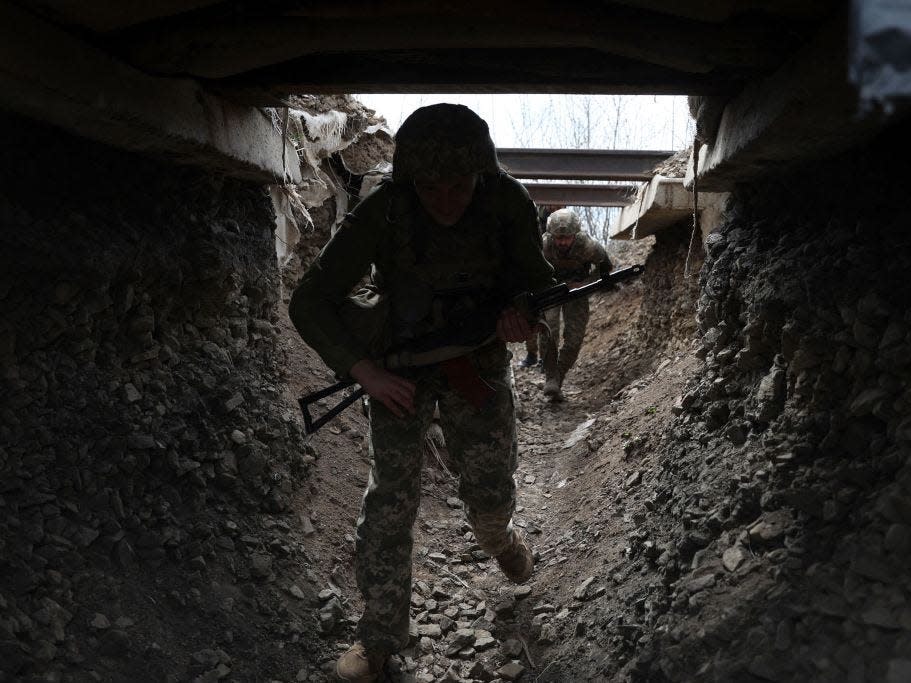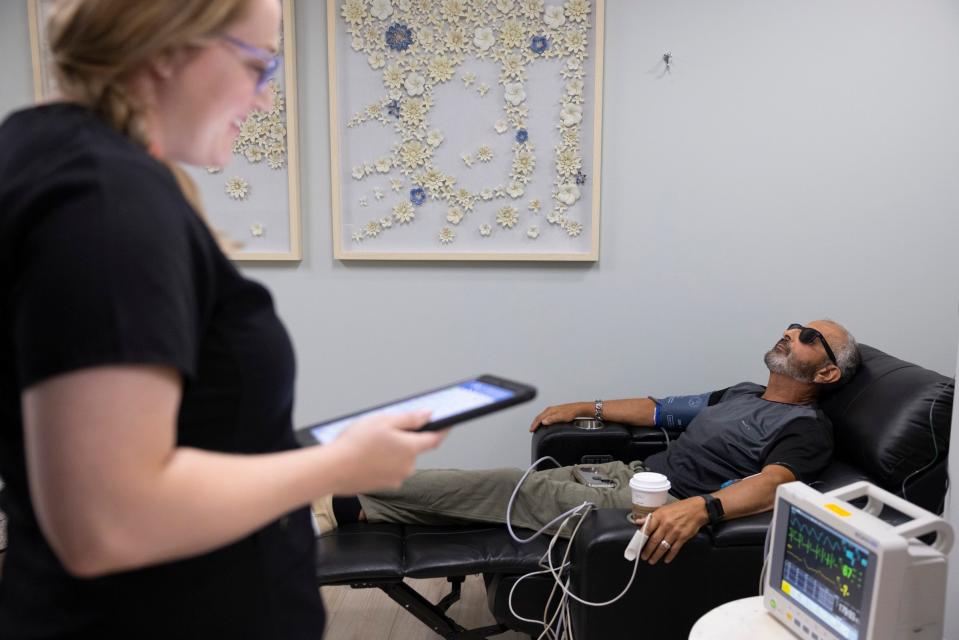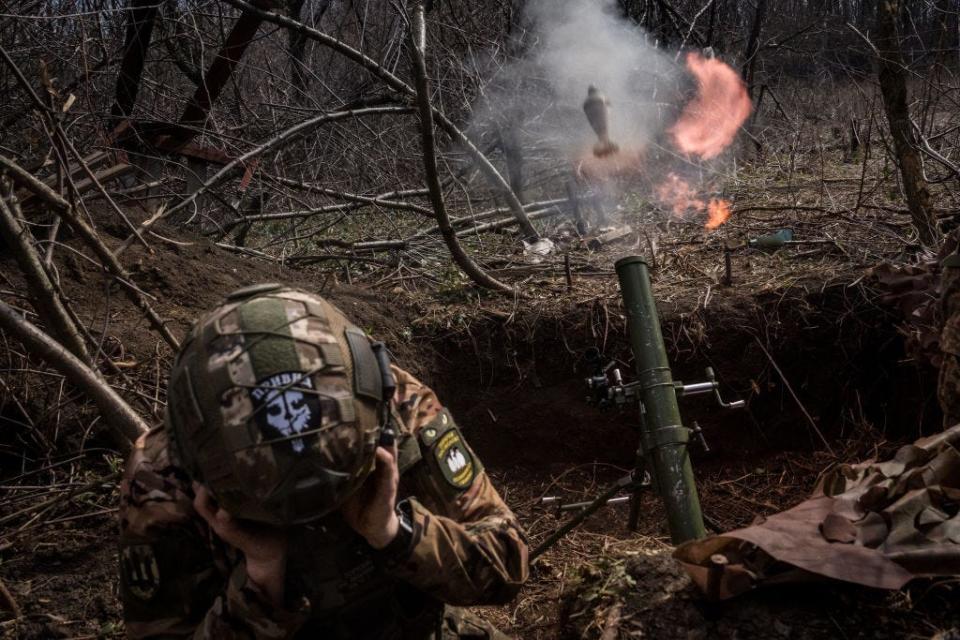Psychedelic therapy with ketamine aims to ease PTSD for Ukrainian soldiers coming back scarred from front-line fighting

Ketamine-Assisted Therapy is being used to treat PTSD in some Ukrainian veterans.
Heal Ukraine Trauma supports the research and use of Ketamine-Assisted Therapy in Ukraine.
HUT's initiative focuses on educating therapists and addressing Ukraine's mental health crisis.
Administered ketamine is being used in concert with therapy to treat Ukrainian veterans who experience post-traumatic stress disorder from fighting on the battlefield.
"Veterans, of course, are really exposed to so much in their work at the front lines and have high rates of PTSD and treatment-related resistant depression," Elaine Klein, the board president and co-founder of an American nonprofit, Heal Ukraine Trauma, supporting the use and research of Ketamine-Assisted Therapy, told Business Insider.
Ketamine-Assisted Therapy, which involves the administered use of ketamine paired with a session of therapy between a patient and a mental health professional, is a lesser-known practice in Ukraine and one that healthcare professionals at Heal Ukraine Trauma believe could effectively treat veterans in Ukraine with PTSD.
Ketamine, a dissociative drug with hallucinogenic properties, was originally approved in the US and Ukraine for anesthetic use.
Since 2019, medical professionals have been able to prescribe a version of ketamine by the name of esketamine or Spravato, available in nasal spray form for treatment-resistant depression in the US, as long as it's taken under medical supervision within a medical facility.

The number of Ketamine clinics providing a variety of services in the US has been growing over the past few years; however, Ketamine-Assisted Therapy is a fairly new practice that is often misunderstood in Ukraine.
Dr. Vladislav Matrenitsky, a Kyiv-based psychotherapist, author, and founder of the Center for Psychotherapy, Psychosomatics and Psychedelic Medicine Expio, told BI that "the problem is not many psychiatrists and psychologists know about the psychedelic therapy."
"They're afraid people will get dependent on this, so still a lot of educational work is needed," he said.
A study published earlier this year focused on the treatment of depression among veterans using ketamine taken through an IV. The doses provided at least partial relief to many of the test subjects and after six weeks of ketamine infusions, depression scores dropped significantly.
Many Ukrainian soldiers have remained in combat since the start of Russia's full-scale invasion of Ukraine in February 2022, and the trauma soldiers may take home from the battlefield could potentially turn into PTSD or take on more severe forms.
The unrelenting nature of this horrific conflict, the catastrophic losses, and the high operational tempo leaving no time for grief can have lasting damage.
Yulia Brockdorf, a psychotherapist who visited the front lines, told BI that it just "layers on, these losses, these injuries, the ungrieved pain."

And when troops return from the front, there may be other struggles or an inability to fully process what they've been through.
That's where the therapy comes into play. "Soldiers, for them, it's natural to consider themselves like a strong man," Matrenitsky said, explaining that the effects of the ketamine therapy allow individuals to overcome defensive barriers over their emotions.
In partnership with Heal Ukraine Trauma, Matrenitsky along with other healthcare professionals have teamed up to form the Ketamine-Assisted Psychotherapy initiative in hopes of educating Ukrainian therapists on Ketamine-Assisted Therapy.
"Without psychotherapeutic support, it becomes very painful, and this is what can bring them to the so-called 'bad trip' — an uncontrolled burst of emotions," Matrenitsky said, "but when we do it in controlled settings, when we work with specialists who know how to do that, then we can process all the trauma."
The initiative, which is currently starting its pilot phase, is focused on group therapy facilitation as Ukraine faces its own country-wide mental health crisis.
Romina Bandura and Paula Reynal, researchers at the Washington-based think tank Center for Strategic and International Studies, wrote last year that Russia's war against Ukraine has likely exacerbated lingering mental health challenges.
"Mental health carries a significant stigma among Ukrainians, and the healthcare infrastructure remains frail," they wrote, but "as Ukraine looks to survive, recover, and rebuild, the provision of quality mental healthcare and the promotion of psychological well-being are central to the country's path to recovery."
There are a number of potential ways to achieve that recovery. Klein said that the hope with their work "is to be able in time to train hundreds or thousands of therapists who will be able to integrate best Western practices with their own Ukrainian culture to help veterans."
Read the original article on Business Insider

